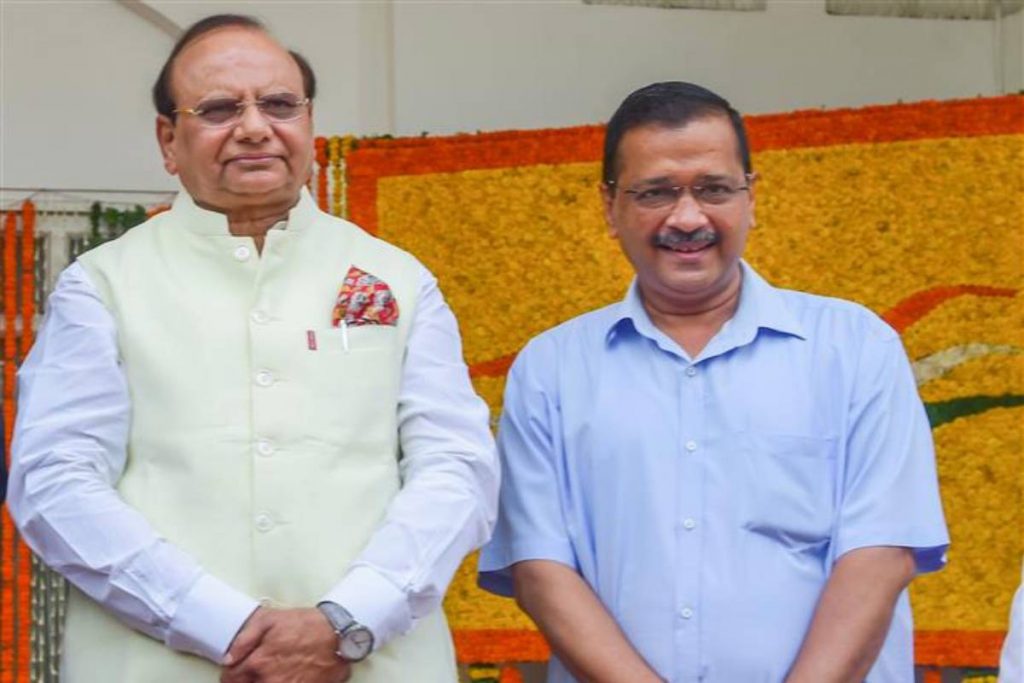
Delhi Chief Minister Arvind Kejriwal railed against the BJP as the Rajya Sabha passed the Delhi Services Bill. Kejriwal labeled it a “black day for democracy of India” even as AAP government in Delhi vowed to fight against the bill in Supreme Court, writes Mudit Mathur
Both the Houses of Indian Parliament passed the Government of National Capital Territory of Delhi (Amendment) Bill, 2023, replacing the earlier Ordinance issued in the matter on 19th May this year with certain changes. Amid rival contentions of treasury and opposition benches with regard to violation of principles of federalism – an unamendable feature of the basic structure of the Constitution of India.
The bill will come into force once the Presidential assent is received as both the houses have already passed it with majority. The Bill provides for indirect control of central government through Lieutenant Governor Delhi over the bureaucrats serving under the various departments functioning under the democratically elected Delhi government led by chief minister and Aam Aadmi Party chief Arvind Kejriwal.
Earlier on May 19, the Centre promulgated the Government of National Capital Territory of Delhi (Amendment) Ordinance, 2023 to set up a National Capital Civil Service Authority for transfer and posting of Group-A officers in Delhi. The Chief Minister is one of the three members of the Authority, while the two others are bureaucrats. The decisions by the Authority are to be taken by a majority and, in the event of a dispute, the matter will be referred to the L-G whose decision will be final.
The AAP government in Delhi has challenged the constitutional validity of the ordinance in the Supreme Court, which has, after deliberations, referred the plea to a Constitution Bench.
Introducing the contentious Bill replacing the Ordinance in the Monsoon session of parliament, the Union government pleaded the necessity of the legislation it its Statement of Objects and Reasons, which explains, “In view of the special status of the National Capital Territory of Delhi, a scheme of administration has to be formulated by a Parliamentary legislation to balance both local and national interests to reflect the aspiration of the people through the joint and collective responsibility of the Government of India and the Government of National Capital Territory of Delhi”.
Home Minister Amit Shah while presenting the Bill denied that it is contradictory to the Supreme Court’s judgment and said that the Court has recognized the power of the Parliament to make law in relation to services in Delhi. “The Constitution has given the House power to pass any law regarding the state of Delhi. The Supreme Court judgement has clarified that Parliament can bring any law regarding the state of Delhi. All objections are political”, he said. The Supreme Court has clarified that Parliament can make law relating to services in Delhi, he emphasised.
Replying to a debate on the Bill in the Lok Sabha, Shah launched a sarcastic attack on the Opposition, saying it was not worried about democracy or the people, but only about saving its newly formed alliance. Taking aggressive jibes at the Opposition coalition, he said, “After the bill is passed, Arvind Kejriwal will again take a U-turn.” He ridiculed the alliance between the Left parties and TMC, and JDU and RJD, calling them opportunistic to save their alliance. He claimed that despite any Opposition alliance, Prime Minister Narendra Modi would return with “complete majority” after the 2024 elections.
Opposing the Bill in the Rajya Sabha, Congress MP Dr Abhishek Manu Singhvi said, “This bill is wholly unconstitutional, fundamentally anti-democratic and a frontal assault on the regional voice and aspirations of Delhi. It violates all principles of federalism, all norms of accountability, models of assembly-based democracy, it hits the basic structure.” The Bill covers all vigilance and non-vigilance cases for initiation of disciplinary actions for these officers. “The objective is clear to create an environment of fear and hysteria, to intimidate civil servants to exercise control over them,” he added.
Raising the question on what is the collective consequence of all these provisions, Singhvi said that the Bill reduces the NCT government, each Minister, and the Chief Minister to a cipher-at the mercy of not only the central government but any secretary appointed by it. It makes the elected government hollow.
The Delhi services bill is a “political fraud” and “constitutional sin” aimed at taking away the powers of an elected government in the national capital, AAP leader Raghav Chadha said in Rajya Sabha. “I am standing today for not representing two crore people of Delhi but 135 crore people of this country,” he said. Invoking the Mahabharata, he said his party seeks justice in the House.
Speaking against the Bill, Chadha said bringing the Ordinance within days of passing the Supreme Court judgement, the Government has challenged the majesty of the Court. The Bill undermines the principle of collective responsibility, he added. Chadha said it was the BJP which fought hard to get statehood for Delhi from 1977 to 2015. He also cited the BJP’s election manifestos demanding full statehood for Delhi.
“This bill is an insult not only to democracy and the Constitution but also to stalwart BJP leaders, including Lal Krishna Advani, Atal Bihari Vajpayee, Madan Lal Khurana, Sushma Swaraj, Arun Jaitley and their 40 years of struggle,” said Chadha. The real reason for bringing this bill is that the BJP has lost six elections in Delhi in the last 25 years, he reminded.
Dissenting the passing of the Bill, Chadha said that “the Ordinance is under challenge in the Supreme Court, which vide its order dated 20 July 2023 has referred the question of whether an Act of Parliament (and not just an Ordinance) can violate the substantive requirements of Article 239AA to a Constitution Bench. As the constitutionality of any Act that may be passed by the Parliament is already before a Constitution Bench of the Supreme Court, it will be proper to await the outcome of the decision before introducing the Bill.”
Supporting the Bill, former CJI and nominated MP Ranjan Gogoi while giving his maiden speech said, “What is sub judice before the Court is the validity of the ordinance and what the house is debating is validity of the law, the question which has been referred to the constitutional bench has nothing to do which has been debated in the House.” “The Bill takes away Article 3A from the ordinance, so the questions which have been referred is self-answered…in my opinion the entire judgement was on Article 3A of the Ordinance, so it is the right of the members to debate on the Bill.
Gogoi said that for NCT Delhi, the state legislature makes the law on the state subjects except three subjects, by virtue of Article 239 (3) (b)- parliament has power to frame laws beyond these three, that is exactly what the Bill is seeking to do, therefore there is no question of overreaching.”
He further said that this law will be bad in law only if it violates the fundamental rights, any provision of the constitution and if it violates the basic structure. The only fundamental right that can be violated is Article 14 if the law is arbitrary. Asking whether the Bill is arbitrary, he said, “It doesn’t appear to be so.” Adding that since Delhi is not a state, he said the Bill is not in violation of Federalism.
Meanwhile Delhi Chief Minister Arvind Kejriwal strongly criticized the BJP as the Rajya Sabha passed the Delhi Services Bill. Kejriwal labeled it a “black day for democracy of India” and questioned the integrity of the bill’s passage. He Kejriwal asserted that the BJP aimed to undermine the Delhi government through backdoor governance. Arvind Kejriwal referred to the passage of the bill as a “black law” and said that it had weakened democracy in the country.
Besides, the BJP’s allies, both the YSRCP and the BJD supported the Bill, as was announced earlier. The BJD and YSRCP have nine members each in Rajya Sabha. With their support, the ruling side has crossed the halfway mark in Rajya Sabha too. The combined Opposition along with the Bharat Rashtra Samithi, which has declared that it will oppose the Bill, could muster the figure of 110 but BJP strategists drained out eight votes from them. The Bill mustered the majority of 131 votes while the opposition tally reduced to just 102.
Now the AAP government may challenge the new legislation afresh before the Supreme Court as its grievance remains unaddressed on the issue of back door governance of the Union government over the elected legislature of Delhi by giving overriding powers to the Lieutenant Governor.













